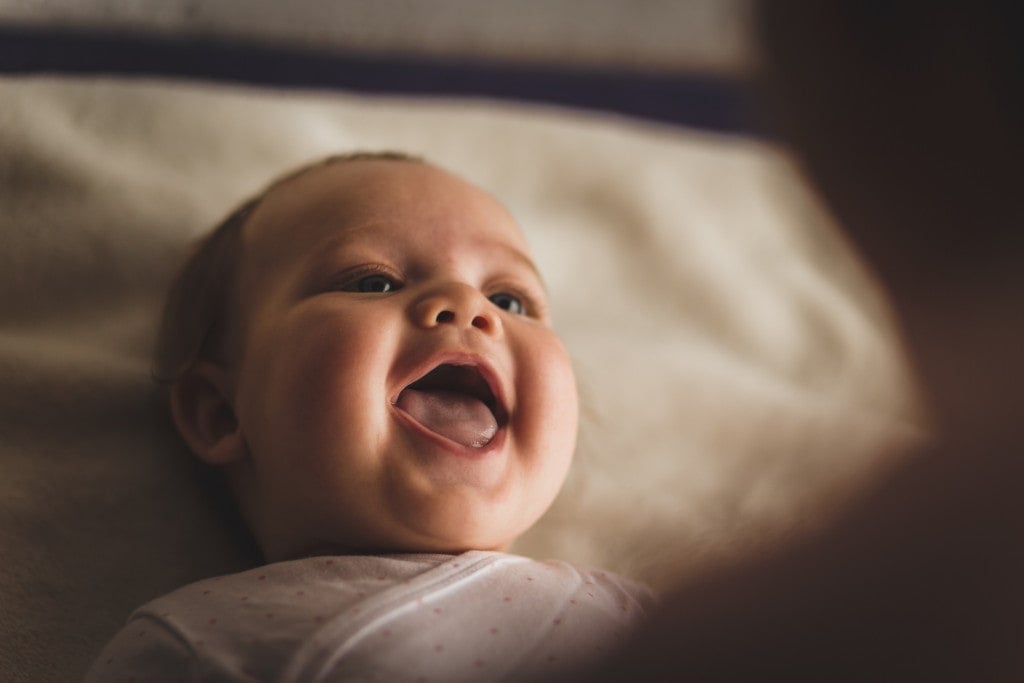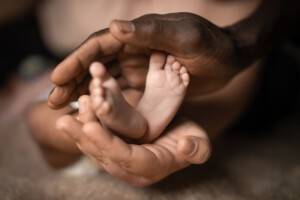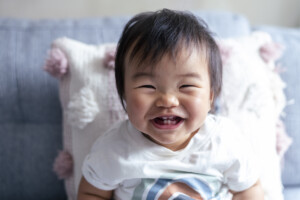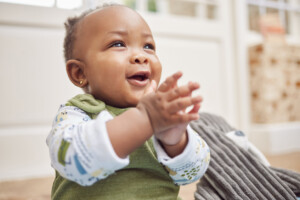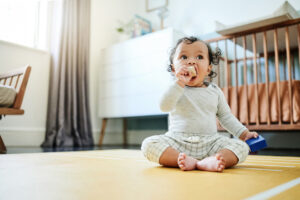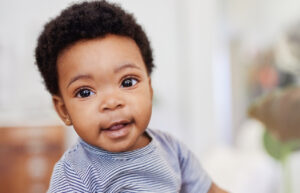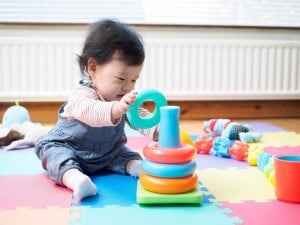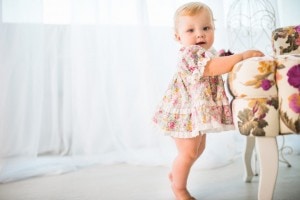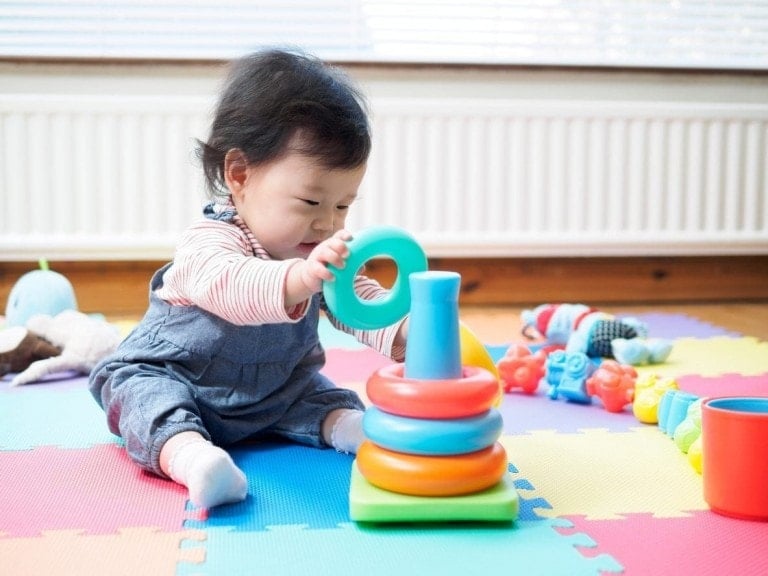There’s no greater sound to a new parent than their baby’s first laughs. These cute giggles assure you that your little one feels happy and safe with you. Baby laughter is one of the most exciting milestones of an infant’s first year. So, when exactly do babies start laughing? This article will cover when babies start to giggle, why they might laugh in their sleep, when to be concerned if your baby isn’t yet laughing, and ways to encourage them to laugh.
When Do Babies Start Laughing?
You may start to hear little laughs coming from your baby at around 3-4 months of age.1 The Centers for Disease Control and Prevention (CDC) and the American Academy of Pediatrics (AAP) list chuckling as a 4-month-old milestone and full-blown laughing as a 6-month-old milestone.2,9
Some researchers report true infant laughter at much younger ages — between 5 and 9 weeks — in response to auditory stimulation such as singing!3 Regardless of exactly when babies start laughing, infant laughter follows a predictable pattern in response to different types of sensory input. Their laughs progress in duration, frequency, and variety as they age.4
Why Do Babies Laugh?
When babies start to laugh, it happens for different reasons based on their age and developmental status. Here’s a typical pattern for why babies laugh:1,3,4,5

Just before 1 year of age, babies may also start to laugh in anticipation of laugh-inducing or funny events, not just as those events occur. At this age, babies may also start participating in funny behaviors, trying to make you laugh as well.5
Benefits of Laughing
When babies start laughing, they will likely reap many benefits of laughing with you. Some of these fun benefits include:
- Bonding: Making your baby laugh (and laughing with them) may facilitate a closer bond, a stronger attachment, deeper intimacy, and a more satisfying relationship.1
- Cognition: Laughing babies demonstrate their ability to recognize that something is funny and express their amusement. This is a testament to their thinking and awareness.1
- Tension release: When a baby is exposed to a new stimulus, this can cause internal tension in their mind and body. Once the infant realizes the new experience is safe, the built-up tension releases, and they may feel relieved, which they express with laughter.4
- Communication: Babies typically start laughing long before they can use gestures or words to communicate.1 Infant laughter tells their caregiver that the baby likes whatever they’re doing, and they should continue to do it or do it again.6
- Pleasure: Simply the experience of smiling and laughing can bring about positive and pleasant feelings of happiness that an infant will seek to reproduce. So, not only is laughter an expression of happiness but a cause of one as well!4
When Do Babies Become Ticklish?
Babies laugh for all sorts of reasons. But one of the most common ways to make a baby laugh is by tickling them. Babies get ticklish when they’re able to distinguish “self” from “other,” as you cannot tickle yourself.6 When babies start laughing, their first giggles are most often a result of positive and unexpected touch, like tickling.1,4 Therefore, babies are likely to become ticklish as soon as they begin laughing, around 3-6 months of age.1,4
In one study of laughter in 2- to 12-month-olds, parents were asked to make their babies laugh, and most parents started by tickling. Parents of the 6- to 12-month-olds were usually successful at making their babies laugh by tickling them, and they were usually successful by 6 months of age.3 Tickling actually becomes a bit less effective at making a baby laugh as they start to appreciate and understand other forms of humor, such as changing social and visual situations and things that don’t go together, between 7 and 12 months of age.5
How To Encourage Your Baby To Laugh

While tickling might be your initial go-to for making your baby giggle, there are many other ways to make a baby laugh. To select age-appropriate games and stimuli to make your baby laugh, refer to the chart earlier in this article on why babies laugh. Here are some other ideas as well:
Tips for Making Babies Laugh
For a 4-month-old, you might try tickling them, blowing raspberries on their belly, blowing air into their hair, singing loudly, or making popping noises. A 5- or 6-month-old might be likelier to laugh at games with a social and surprise element, like peek-a-boo. For 7- to 9-month-olds, you may get your baby to laugh at changing visual cues, like shaking your hair or thrashing your limbs. As your baby approaches 1 year, they may start to understand things that don’t go together, like adults and pacifiers, and they might laugh at the silliness of you putting them together.1,3,4,5
Right around 9 months, I remember my baby laughing so hard at me jumping off the bed onto the floor! You never quite know what’s going to make them laugh. You might have to get creative, but it’s fun — and sometimes a bit embarrassing — to try!
Just remember, you can’t be self-conscious when encouraging your baby to laugh. In one study, mothers struggled to make their babies laugh in a lab because an observer was watching them. Babies were more likely to laugh at home, possibly because they were more comfortable and familiar there, but also because the caregiver was more comfortable and uninhibited.3 If you’re struggling to get your baby to laugh, keep these simple efforts and elements in mind:3
- Games: Games like peek-a-boo and pat-a-cake incorporate multiple elements of humor that often make babies of varying ages laugh.
- Surprises: Try unexpected, strange, or sudden sounds, sights, and movements like thrashing or jolting.
- Anticipation: As a baby waits for something funny, happy, or exciting to happen, they may laugh in anticipation of the pleasure. For example, try tickling the air as you reach in to tickle their belly. They may laugh before you even touch them!
Why Do Babies Laugh in Their Sleep?
Sometimes, you might catch your very young baby smiling or laughing in their sleep. This is considered spontaneous and not in response to an outside stimulus.7 Sleep-laughing most often occurs during rapid eye movement (REM) sleep, and it may be a reflex. During REM sleep, babies are very active and may almost seem awake.7 Researchers aren’t quite sure why babies laugh in their sleep, but it’s a phenomenon that happens in infants 0-2 months old. Sleep laughing in babies typically lasts around three seconds and involves both a smile and a vocalization.7
Why Would a Baby Not Laugh?

While most babies start laughing around 4-6 months of age, they don’t all laugh at the same time or at the same things.2 There are many reasons why a baby might not be laughing yet or in certain scenarios, including:
- Temperament: Every baby has a different personality and temperament. Some may laugh more easily and appreciate humor early on. Others may be more serious, and it can be harder to make them laugh.1
- Development: Laughter signifies more than just making a facial expression and a sound. A baby must be able to sense a stimulus, recognize it as different, and express that it’s funny to them. They may simply not have integrated all those skills yet to form laughter.4
- Hearing or vision impairment: These sensory difficulties can prevent a baby from seeing or hearing things that might make them laugh. However, one study reported that deafness didn’t impair non-speech sounds like crying and laughing.8
- Fear: A particular stimulus can make a baby laugh in one setting and scare them in another. For instance, a baby may laugh when their parents tickle them but cry when someone new does it. If a baby is already fussy, something that usually makes them laugh may frustrate them or make them cry. A baby may also not laugh at times depending on their environment and feeling of safety.3
- Hypotonia: Low muscle tone can make it difficult for a baby to laugh. One study found that babies with the lowest muscle tone didn’t laugh until 13 months of age.5
What Not To Worry About
If your baby is under 6 months old and not laughing yet, there’s usually no need to worry.2 You also don’t need to worry about what your baby laughs at — these variables naturally change with time as they develop cognitively. Children with special needs may smile and laugh later than typically developing babies, but they follow the same pattern of laughter triggers and development once laughter begins.3
Frequently Asked Questions (FAQ)
It can be exciting but sometimes stressful to await your baby’s first laughing fit. Continue interacting with your little one with loving touch, vocalizations, and eye contact. Over time, you will discover their favorite triggers. Before you know it, you will be their favorite person to laugh at!
